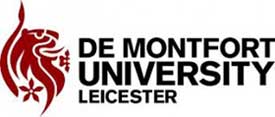Human Resource Management courses
De Montfort University

- UK
- World Rank : 601
- Visit Website
This course equips you for a career as a manager, capable of reflecting critically on your own practice and that of an organisation. You will study issues including the impact of HRM practices on firms’ performance, managing change, business law, employment relations, organisational culture, motivation and leadership.
It combines HRM with the study, from beginners’ or post-GCSE or A-level, of a foreign language. At a time when the graduate employment market is very competitive, having a recognised competence in a foreign language can set you apart from most other graduates and thus enhance your career prospects.
Competence in another language has become an essential skill for success in the global job market. By combining your study of Human Resource Management with a language, you will develop not only competence in the language itself, but will also enhance your employability; a language distinguishes you from other graduates.
Did you know that French is an official language in 32 countries, with a projected growth to 750 million people worldwide by 2050; Mandarin Chinese is currently the language with the greatest number of speakers; and Spanish has over 470 million speakers worldwide including in Central and South American countries and the USA? You can start your study of languages at DMU (French, Mandarin or Spanish) at beginner, GCSE (intermediate) or Advanced level.
We currently offer the following language combinations:
Key features
Entry criteria
English (Language or Literature) and Maths GCSE required as separate qualifications at grade C
We will normally require students to have had a break from full time education before undertaking the Access course
English language
If English is not your first language, an IELTS core of 6.0 (including a minimum of 5.5 in each component) or equivalent is normally required.
| Type of Institution | Public |
| Campus Setting | Urban |
| Endowment | £1.17 million |
| Number of Campuses | 4 faculties |
| Number/Percentage of International Students | 23205 |
| Total number of Professors | 3240 |
| Student Satisfaction Rate | 86% |
| Graduate Job Rate | 97.3% |
| Number of Residence Vacancy | Around 3000 |
| International fee | Undergraduates- £13240 (annual) Postgraduates- £15950 (annual) |
| Number of Academic Programs | UG, PG, Part time, distance, blended |
| Mode of Program | Full time, distance and online |
| Average Graduate Salary | 19800 pounds a year |
| Field of Study | Avg.Fees |
|---|---|
| Art, Design and Humanities: | £13,750 |
| Business and Law | £13,750-£14,550 |
| Media | £13,750 - £14,250 |
| Engineering | £14,250 |
| Computing | £14,250 |
| Health and Life Sciences | £13,250 - £14,250 |
| Nursing BSc | £14,950 |
| Expenses | Estimated cost in pounds |
|---|---|
| Undergraduate tuition fee | 13,250- 14950 |
| Postgraduate tuition fee | 13600-15,900 |
| On campus accommodation | 5,000-6040 |
| Average cost of living | 97-110 per week |
DMU International Scholarship up to 1500 pounds
| Tuition Fees in UK (1st Year Average) | MS: £17276 | MBA: £17276 | BE/Btech: £16632 | BBA: £15130 | BSc: £16632 | MFin: £19000 | MA: £15560 | MIM: £18241 | MEM: £16950 | MArch: £14271 | BHM: £12662 | MIS: £15344 | MEng: £12876 | MBBS: £28865| MPharm: £15452 |
| Average Accomodation & Food Costs in UK | £850 to £1,050 a month |
| Entrance Exams in UK | TOEFL: 88 | IELTS: 6.5 | PTE: 59 | GMAT: 590 |
| Work and Study in UK | Permitted for 20 hours/week with a valid study permit. |
| Post Study Work Permit in UK | 2 Year after graduation depending on the course. |
| Cost of Student Visa in UK | £348 |
| Student Visa in UK | Your nationality, duration of your stay and purpose of your stay are the three essential factors for UK visa. For Non-EU students UK visa is mandatory. |
| Intakes in UK | There are mainly two intakes in UK: January/February & September/October. |
| Top Job Sectors in UK | IT Engineering, Product Design, Mobile Development, Designers, Logistics, etc. |
| Economy in UK | Growth Rate: 1.3% (2018) 1.4% (2019) 1.4% (2020e), 6th Largest Economy in the World by Nominal |
Tuition & fees :
£ 14,250
Hostel & Meals :
£ 6,063
Total
£ 20,313